Coffee Has Shot up in Price—Here's How To Save On Your Morning Brew
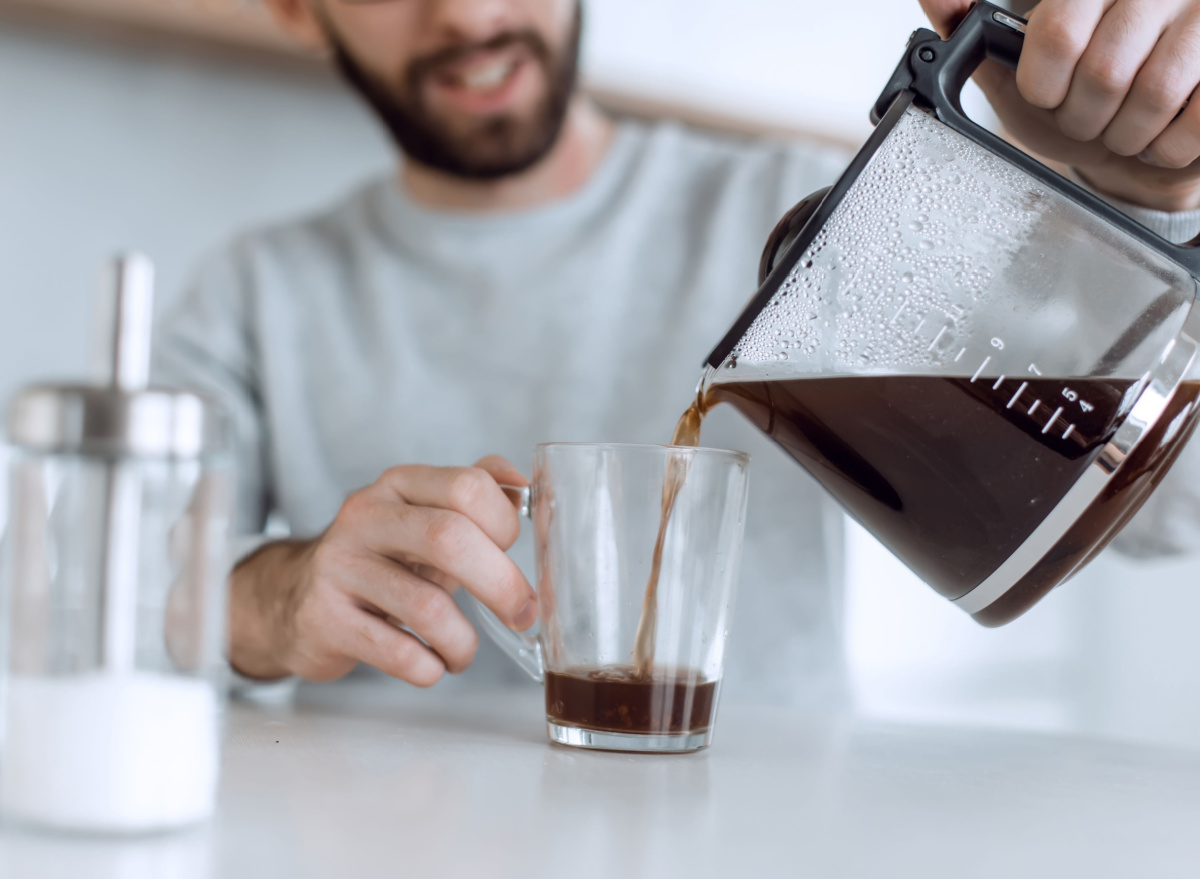
America runs on coffee (and not just the kind from Dunkin'.) But, as is the case with nearly everything else, that delicious and essential fuel has recently seen massive spikes in price. And, we're not just talking about that daily latte you grab from Starbucks either. The coffee beans or grounds that you brew at home may no longer be as economical as you thought they were. In fact, they have gone up anywhere from 13 to 24 percent in cost—depending on where you live—since this time last year, according to data from the U.S.Bureau of Labor Statistics.
Founder of Coffee Hex and former barista Lauren Winder Hoar gives some insight into why this startling change in the coffee market has occurred, putting a damper on our mornings. "Outside of the outrageous inflation we've been dealing with, coffee supply levels have taken a hit over the last couple of years," she reports. "Brazil is the world's foremost coffee exporter—and the country has been dealing with drought and odd weather since 2021. Some farmers have lost up to 50% of their Arabica yield. And as a nation, we're certainly not drinking any less coffee. In fact, the demand for coffee continues to rise slowly as it has for years. Take these two factors and you have a classic supply-and-demand imbalance affecting the price of your java."
Marko Lazarevic, coffee expert and founder of Craft Coffee Spot, points out an additional reason for the recent hikes in coffee prices. "Some cost increase is due to more sustainable practices on green coffee and packaging," he says, adding, "It costs more to make bags biodegradable and pay farmers a living wage." Lazarevic explains that while these are positive changes that help the environment and ultimately result in better coffee, they simultaneously cause coffee price tags to relentlessly tick up and up.
While the coffee outlook seems dim, there's hope. Making just a few tweaks to your daily coffee routine can help you to stick to your grocery budget without having to sacrifice or limit your caffeine addiction. Read on for some tips to save money on your brews straight from the mouths of coffee experts.
Grind your own.
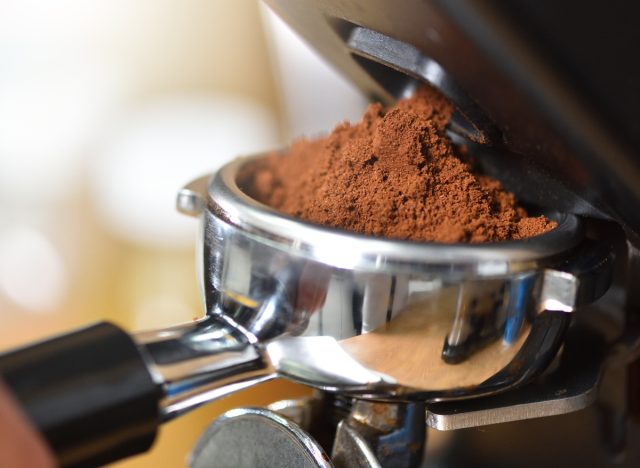
We know, we know, there's a certain level of convenience and time savings that comes with buying coffee grounds over whole beans. But at the end of the day, your wallet will thank you for making the switch. Roasty Coffee contributor Kelsey Waddell says, "Pre-ground coffee is often more expensive than whole-bean coffee, and grinding your own beans can save you money while delivering much better flavor."
If you're not willing to splurge on a fancy grinder, you can get the job done with a food processor or a high-power blender such as a Nutribullet. But, if you do choose to step up to the big leagues and invest in a grinder, it will likely pay for itself in no time. As you're shopping and weighing your options, consider going with a burr grinder, which Hoar suggests. Burr grinders pulverize coffee beans between two revolving burrs (hence the name), typically resulting in more consistent, quality grounds.
Pay attention to the amount you're using.
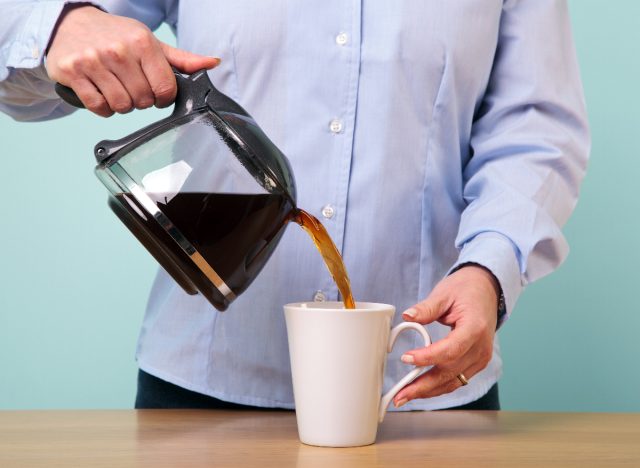
Do you ever go to make your morning java and end up shamefully pouring out a few sad cups leftover from yesterday's brew? Well, that's just money down the drain…literally. Make sure you're only making what you need on a day-to-day basis. Remember, you can always make a few more cups, but you can't magically revert that liquid back into grounds!
Waddell also stresses the importance of always using the correct coffee-to-water ratio. She says, "Using too much coffee can be a waste of beans and money while using too little can result in weak or flavorless coffee." To get the most out of your precious coffee grounds, you'll want to measure them out meticulously. Put that normal soup spoon back in the drawer and use a coffee scoop with exact measurements instead. If you're looking to get down to the real nitty gritty, a kitchen scale can also come in handy.
Consider a new brewing method.
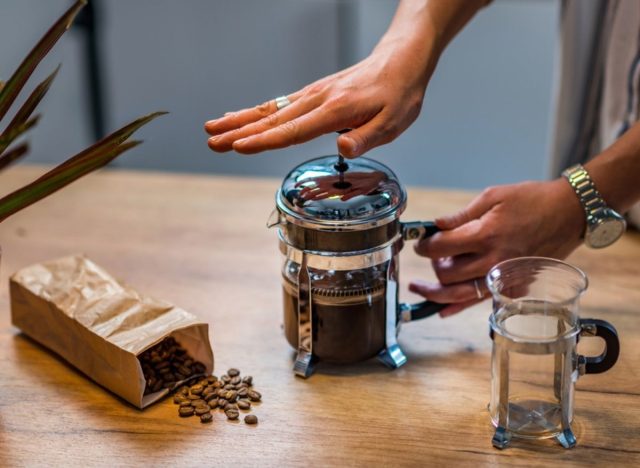
There are many different ways you can brew your coffee at home, and they are not all created equal in terms of both quality and price. "Some brewing methods require expensive equipment or filters, while others can be more cost-effective," says Waddell. "For example, a French press or pour-over setup can be affordable and yield great results." Aeropresses and automatic drip machines are fairly common as well, and are more economical choices. Hoar also specifically warns against pre-made and sealed single cups—such as Keurig K-Cups—which she says cost, on average, around 400% more than other brewing methods.
Buy in bulk.
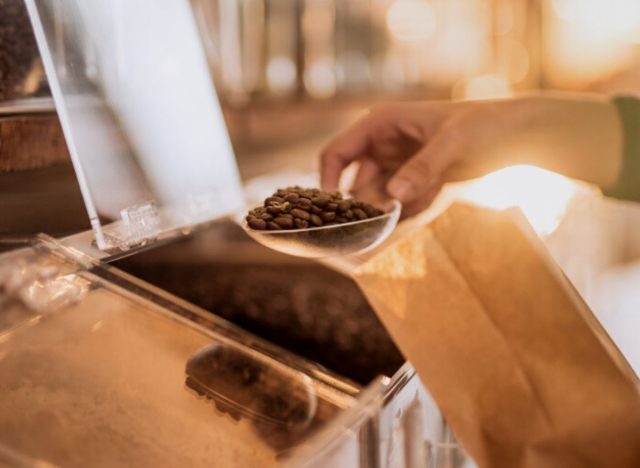
Food experts will likely tell you to use caution when buying coffee in bulk, as it can lead to waste. But, when proper storage techniques are used, it can actually be a very financially smart decision. "Purchase coffee beans or grounds in larger quantities and store them in a cool, dry place in an airtight container to maintain freshness," advises Waddell. Stockpiling coffee in the freezer can also help to extend shelf life, and in general, you'll be able to squeeze flavor out of beans for at least a few months longer than grounds.
If you're a Costco member looking to go the bulk buying route, Hoar would steer you towards the Kirkland Signature brand, and specifically its whole bean options. Judging by Kirkland's success with other products, we know we can trust the brand with our beloved cup of joe.
Opt for a subscription-based coffee brand.
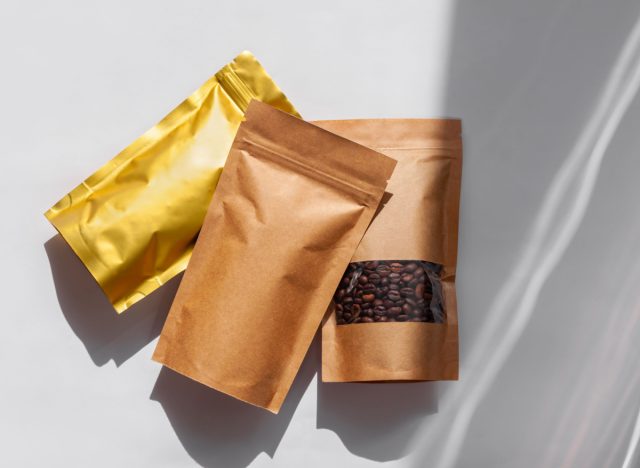
The perfect amount of coffee delivered right to your door? Why didn't we think of this earlier? Many companies offer this convenient service and what's more, many will even offer you discounts when you take advantage of their subscription options. Waddell says this can, of course, save you money but you will also likely end up with fresher beans than what you can find at the store.
Try popular options like Atlas Coffee Club or Trade. Each allows you to select your preferred roasting methods, favorite coffee types and flavor profiles, and the frequency of your deliveries—a perfect customized java experience at your fingertips!
Buy local.
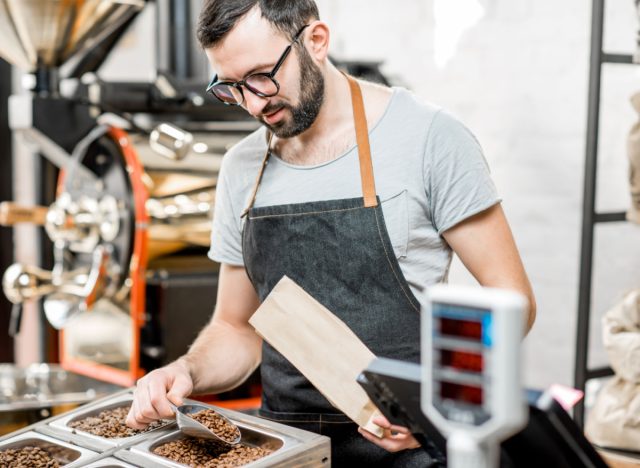
Purchasing local and direct from coffee shops is also a good idea, according to Lazarevic. "A lot of the markup for coffee comes from retail chains and shipping costs," he says. "The shipping costs are particularly high for low-cost items like coffee. If you buy from a local roaster, you can get a better price by cutting out the middleman." With thousands of coffee shops in the U.S., you won't be short on options to choose from in your area. Plus, you can feel good about supporting local businesses rather than the coffee juggernauts.









